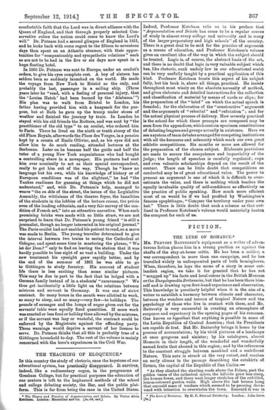FICTION.
THE LURE OF ROMANCE.*
ME. PREVOST BATTERSBY'S equipment as a writer of adven- turous fiction places him in a strong position es against the shafts of the stay-at-home critic. He has been a soldier, a war correspondent in more than one campaign, and he has travelled widely in unfrequented parts of both hemispheres. When, therefore, he lays the scene of a story in some out- landish region, we take it for granted that he has not " mugged up" his facts and local colour in the British Museum or the Encyclopaedia Britannica, but that he has been there him- self and is drawing upon first-hand experience and observation. This knowledge is peculiarly helpful when it is the aim of a writer to establish a harmony between climate and character, between the wonders and terrors of tropical Nature and the psychology of those who live in contact with them, and Mr. Battersby is very successful in creating an atmosphere of suspense and expectancy in the opening pages of his romance. One knows ex hypothesi that anything is possible in some of the Latin Republics of Central America ; that its Presidents are capable de tout. But Mr. Battersby brings it home by the process of accumulation; by his vivid pictures of a landscape at once gorgeous and sinister; by his catalogues, almost Homeric in their length, of the wonderful and wonderfully named fruits that abound in this region ; and by the references to the constant struggle between mankind and a maleficent Nature. This note is struck at the very outset, and reaches an early climax in the passage describing the outskirts of Soma, the capital of the Republic of San Carlos
As they climbed the slanting roads above the Palace, past the golden vanes of the cathedral spires, the hillside grow less steep, the houses fewer, and there were longer stretches of the red-tiled, lemon-coloured garden walls. High above the last houses hung that emerald mass of verdure which seemed to be pressing down- ward with intention to overwhelm the town. Emerald it was in
• The Lure of Romance, By II. F. Prevost eattersta. London: John Lane. [CL] its depths, but where the sun blazed upon its tangled border was the flaming green of the parrot's wing. The road wound to and fro through it, above the outskirts of the town, in a green twilight which deepened as the palms, arborescent ferns and wild guavas —that looked translucent in the stray shafts of light—gave place to colossal trunks between which hung dense curtains of lianas and parasitical creepers. Doyne beguiled the way with grim stories of the woods, in which he seemed to feel a malignant per- sonality, after having had to keep them at bay with axe and cutlass for close on two years ; stories of the almost human per- sistency and determination with which, winning their own back again, they crushed the man who suspended, ever so briefly, his destructive vigilance; stories, too, of the creatures swarming in their unfathomed thickets, serpents with death in a touch of their tongue, and monstrous crabs, crawling cataracts of which had more than once slid down upon the town for a ghastly feast on living human flesh, their clattering carapaces piled into heaps half as high as the houses."
As for the story, it describes the adventures of two young Englishmen—one a Peer and an ex-Guardsman, the other a rich, humorous, indolent man of the world—who went for a pleasure trip to the American tropics, and fell in with an Oxford contemporary, a Rhodes Scholar from the States, now engaged in carrying out a contract for the supply of water to Sovara from the interior. Their arrival happens to coincide with the eve of a revolution, in which Doyne, the American, from a mixture of motives, espouses the cause of the President, a Scoto-American named Mackellar, ruthless and corrupt as an administrator, but redeemed, from the romantic point of view, by the possession of two lovely and highly accomplished daughters. The Englishmen stand in, partly from chivalry, but chiefly because they are dominated by the personality of Doyne, to whom Mr. Battersby impartially assigns the beau role in a short but sanguinary fight against heavy odds. Charters, the rich man and owner of the yacht ganthe,'
rises to the occasion, and surprises himself as well I 1 .9 the reader ; but the Peer cuts a somewhat undignified figure by
withdrawing from his suit when the downfall of the President leaves his daughters penniless. As for the two young ladies, they are so strongly contrasted, except in the matter of per- sonal charms, as to excite something like incredulity that so calm, normal, gentle a creature as Celine should be the sister of the tropical and fiery Francillette. We like Mr.
Battersby better when he is immersed in incident than when he is reproducing the persiflage of compliment, describing the wonderful attire of the Mackellar sisters, or coining phrases to express the complex emotions of his characters. In these moods he is betrayed into a literary preciosity which is curiously ill-attuned to the barbaric crudities of the general situation.



































 Previous page
Previous page